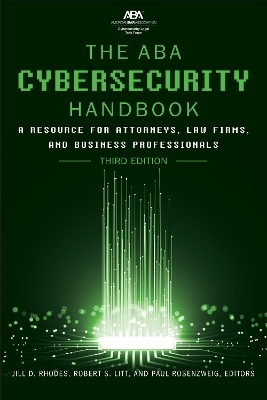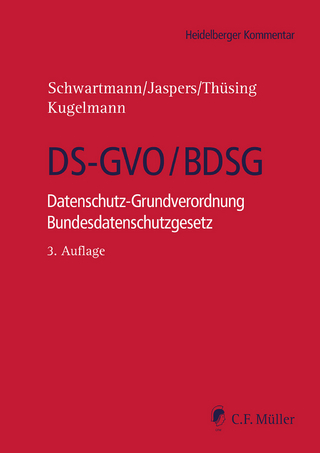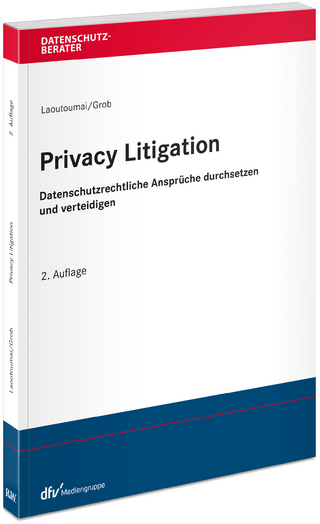
The ABA Cybersecurity Handbook
American Bar Association (Verlag)
978-1-63905-068-0 (ISBN)
- Titel z.Zt. nicht lieferbar
- Versandkostenfrei innerhalb Deutschlands
- Auch auf Rechnung
- Verfügbarkeit in der Filiale vor Ort prüfen
- Artikel merken
“Cybersecurity remains a top concern in the legal profession. A data breach is a question of when, not if. Lawyers must take steps to protect their own security and privacy, as well as that of their clients. The ABA Cybersecurity Handbook is a vital desk-side resource to help lawyers understand the nature of the threat, protect their practices and their clients’ confidential information and intellectual property, and comply with ever-changing legal rules.”
—Reggie Turner, President, American Bar Association
This third edition of The ABA Cybersecurity Handbook updates and expands upon the issues raised in the first two editions. The cybersecurity landscape has undergone seismic changes since the publication of the second edition in 2017. The COVID-19 pandemic has brought new levels of technology integration to the practice of law, accompanied by new and expanded cybersecurity risks. Beyond the legal profession, the SolarWinds, Kaseya, and Colonial Pipeline breaches have set new and alarming precedents. Heightened cybersecurity risk worldwide has prompted increased responses from the US federal government and from the international community.
Amid these ongoing developments, the Handbook is at your fingertips as a guide to preparing for and responding to cybersecurity threats and incidents. The foundational information it shares will remain relevant even in a changing environment. The recommendations within each chapter, located at the end, provide an easy guide for developing and implementing an effective cybersecurity program, including building the understanding of lawyers’ legal and ethical obligations to provide effective provide data security.
The Handbook covers a wide array of topics and provides a comprehensive look not only at the threat developments of the past few years, but also at the trends that have been established in cybersecurity. The Handbook addresses concerns and provides recommendations for several different types of legal practices—small firms and large ones, government lawyers and in-house counsel. Overall best practices are developed and shared throughout the Handbook. As the cybersecurity landscape continues to evolve, the Handbook will be an indispensable reference for you and your practice.
JILL D. RHODES is vice president and chief information security officer for Option Care Enterprises, Inc. Her responsibilities include the integration of information security governance, education, process development, and technology into all facets of this multibillion-dollar health care company. Prior to moving to the private sector, Ms. Rhodes spent 20 years working in and with the national security community of the federal government. She joined the Office of the Director of National Intelligence (ODNI) where she supported the intelligence community (IC) integration of data and security into the Cloud Environment for the IC Chief Information Office. In addition to other national security roles, Ms. Rhodes worked with data management, foreign language, and training matters on behalf of the National Clandestine Service of the CIA, addressing issues such as data security and exploitation. Before joining the national security community, Ms. Rhodes was a foreign service officer, stationed in Bolivia and Russia. She also worked extensively throughout Eastern and Southern Africa. Ms. Rhodes was honored with the 2019 Chicago-area CISO of the Year award. She has written, published, and speaks nationally about cybersecurity issues. Ms. Rhodes was the co-editor of the first and second editions of the ABA Cybersecurity Handbook: A Resource for Attorneys, Law Firms, and Business Professionals and edited the book National Security Law, Fifty Years of Transformation: An Anthology (2012). In addition, she has written articles and chapters on various cybersecurity topics and is regularly interviewed about cybersecurity for different publications. She is a graduate of the University of Illinois at Urbana-Champaign, the University of Cincinnati College of Law (JD), and the George Washington University College of Law (LLM). She is also a certified information security manager and certified information privacy professional/IT. Robert S. Litt if of counsel in the firm of Morrison & Foerster. He served as the second General Counsel of the Office of the Director of National Intelligence (ODNI) from June 2009 until January 2017. Before joining the ODNI, Mr. Litt was a partner with the law firm of Arnold and Porter, LLP. He served as a member of the governing body of the American Bar Association’s Criminal Justice Section and a member of the Advisory Committee to the Standing Committee on Law and National Security. He previously worked at the Department of Justice, where he served as Deputy Assistant Attorney General in the Criminal Division and as the Principal Associate Deputy Attorney General; as special advisor to the Assistant Secretary of State for European and Canadian Affairs; and as an assistant U.S. Attorney for the Southern District of New York. Mr. Litt started his legal career as a clerk for Judge Edward Weinfeld of the Southern District of New York and Justice Potter Stewart of the U.S. Supreme Court. He holds a BA from Harvard College and an MA and JD from Yale University. With Jill D. Rhodes, he co-edited the second edition of the ABA’s Cybersecurity Handbook. Paul Rosenzweig is the founder of Red Branch Consulting PLLC, a homeland security consulting company. He is also a Senior Adviser to the Chertoff Group. Rosenzweig formerly served as Deputy Assistant Secretary for Policy and twice as Acting Assistant Secretary for International Affairs in the Department of Homeland Security, where his responsibilities ranged from aviation security, border control, and visa policy to international data sharing, biological threats, and international relations. He is currently a Professorial Lecturer in Law at George Washington University, where he teaches a class on cyber security law and policy and is also a Senior Fellow in the Tech, Law & Security Program at American University. He is a Senior Editor of the Journal of National Security Law & Policy and in 2011 he was a Carnegie Fellow in National Security Journalism at the Medill School of Journalism at Northwestern University. He is also a special advisor to the American Bar Association Standing Committee on Law and National Security. Rosenzweig is a cum laude graduate of the University of Chicago Law School, has a master of science degree in chemical oceanography from the Scripps Institution of Oceanography, University of California at San Diego, and a bachelor's degree from Haverford College. Following graduation from law school, he served as a law clerk to Judge R. Lanier Anderson III of the U.S. Court of Appeals for the Eleventh Circuit. He is the co-author (with James Jay Carafano) of the book Winning the Long War: Lessons from the Cold War for Defeating Terrorism and Preserving Freedom and author of the book Cyber Warfare: How Conflicts in Cyberspace Are Challenging America and Changing the World. He has edited two volumes for ABA publications, and recorded three video courses for The Great Courses, most recently "Investigating American Presidents."
| Erscheinungsdatum | 17.08.2022 |
|---|---|
| Zusatzinfo | Illustrations |
| Verlagsort | Chicago, IL |
| Sprache | englisch |
| Maße | 152 x 228 mm |
| Themenwelt | Recht / Steuern ► EU / Internationales Recht |
| Recht / Steuern ► Öffentliches Recht | |
| Recht / Steuern ► Privatrecht / Bürgerliches Recht ► IT-Recht | |
| Wirtschaft ► Betriebswirtschaft / Management ► Unternehmensführung / Management | |
| ISBN-10 | 1-63905-068-X / 163905068X |
| ISBN-13 | 978-1-63905-068-0 / 9781639050680 |
| Zustand | Neuware |
| Haben Sie eine Frage zum Produkt? |
aus dem Bereich


